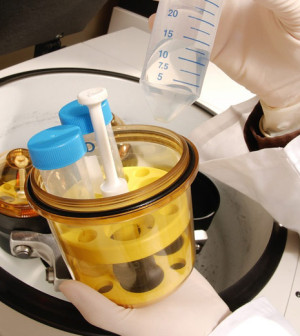- 10 Strategies to Overcome Insomnia
- Could Artificial Sweeteners Be Aging the Brain Faster?
- Techniques for Soothing Your Nervous System
- Does the Water in Your House Smell Funny? Here’s Why
- Can a Daily Dose of Apple Cider Vinegar Actually Aid Weight Loss?
- 6 Health Beverages That Can Actually Spike Your Blood Sugar
- Treatment Options for Social Anxiety Disorder
- Understanding the Connection Between Anxiety and Depression
- How Daily Prunes Can Influence Cholesterol and Inflammation
- When to Take B12 for Better Absorption and Energy
Longer Colonoscopy Time May Cut Cancer Risk


Don’t hope for a quick colonoscopy.
The longer your screening takes, the less likely you are to get colon cancer, a new study suggests.
The findings provide strong evidence to support current guidelines about how long colonoscopies should last, the researchers said.
In a colonoscopy, a doctor inserts a thin tube with a tiny camera on it into the patient’s colon. After it’s fully inserted, the tube is slowly withdrawn, enabling the doctor to carefully examine the lining of the colon for signs of cancer or precancerous growths.
The guidelines state that “normal” colonoscopy withdrawal time is at least six minutes. In a normal colonoscopy, the doctor does not see any abnormalities or remove any tissue samples for biopsy.
Researchers reviewed nearly 77,000 screening colonoscopies performed over six years by 51 gastroenterologists at a large practice in Minnesota. On average, colonoscopy withdrawal times lasted nearly nine minutes, but about 10 percent of the doctors had individual averages of less than six minutes, the investigators found.
Patients whose screenings were performed by doctors whose average colonoscopy withdrawal time lasted less than six minutes were twice as likely to develop colon cancer within five years as those whose doctors’ colonoscopy withdrawal time averaged more than six minutes, the findings showed.
Colonoscopy withdrawal times that went beyond eight minutes did not seem to provide an extra reduction in cancer risk.
“Our results support the use of withdrawal time as a quality indicator, as recommended by current guidelines,” study lead author Dr. Aasma Shaukat, of the Minneapolis Veterans Affairs Health Care System, said in a VA news release.
The reasons for shorter colonoscopies vary, but “generally, every physician aims to do a complete inspection of the colon lining, regardless of their withdrawal time,” Shaukat said.
The study was published online recently in the journal Gastroenterology.
More information
The U.S. National Institute of Diabetes and Digestive and Kidney Diseases has more about colonoscopy.
Source: HealthDay
Copyright © 2026 HealthDay. All rights reserved.










